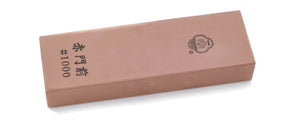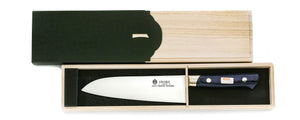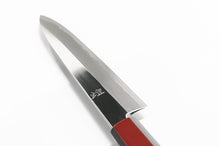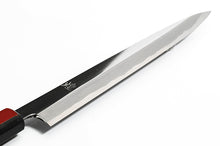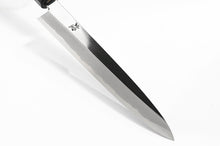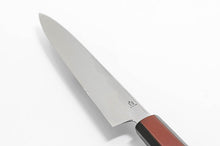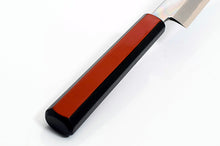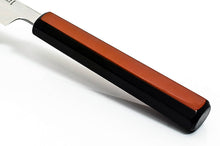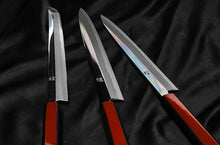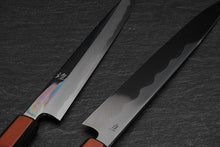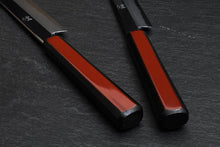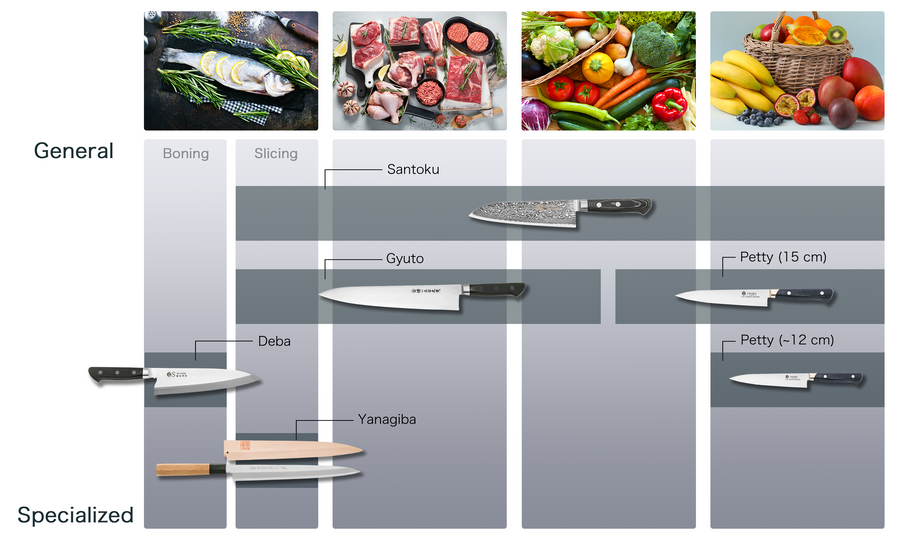
An ideal Japanese Knife with a luxurious lacquer coating handle
A masterpiece of combination between two different Japanese traditional skills proudly presented: knife making and lacquering. It is not just used as a tool, but gives special satisfaction to both the user and the viewer.
- Blade: White Steel No.1: An ideal knife steel which is superb sharp and easy to sharpen.
- Mirror Finish Blade: A blade with luster that evokes the sense of luxury. This also grants more resistance to rust than other surface finishes.
- Handle: Akaro Urushi Lacquered Handle
| Product number | Actual Blade Length (mm) | Full Length (mm) | Total Weight (g) |
|---|---|---|---|
| 1ks1-240 | 230 | 380 | 155 |
| 1ks1-270 | 260 | 410 | 170 |
| 1ks1-300 | 290 | 440 | 195 |
| Blade | Material Name | Handle |
|---|---|---|

Single Edged |
White Steel #1 | Urushi Finish Handle |

Yanagiba (Sashimi Knife)
Yanagiba knives are mainly used for cutting Sashimi. The sharpness and edge geometry is of the utmost important with a Yanagiba, as a dull knife will damage the delicate fibres of the fish. The blade is long, slender, thin and sharp for cutting sashimi in one stroke. In addition to cutting sashimi, this knife is also used for pulling the skin. Professionals use long Yanagiba knives with blades around 300mm. For home use, Yanagiba knives with a blade of around 210mm are popular.
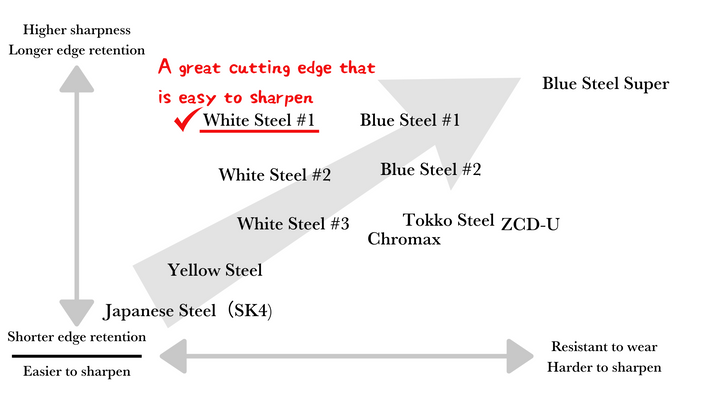
White Steel #1
The steel closest to Tamahagane, boasting high edge retention while staying easy to sharpen. Recommended for those who seek the most premium and pure sharpness experience.
Carbon Steel
White Steel #1 has higher carbon levels than White Steel #2, giving it both better hardness ratings and longer edge retention. This is done without sacrificing the ease of sharpening and lack of impurities that White Steel is known for, creating an ideal steel for those who want the sharpest cutting experience.
This steel is difficult to forge with, requiring high levels of skill to produce quality knives with. As our knives are forged, quenched and sharpened by skilled artisans, we're able to produce these premium knives.
If you're seeking the ultimate sharpness, White Steel #1 is for you.
*NOTE: Carbon Steel is susceptible to rust if it is not properly cared for. Please clean and dry the blade regularly during use and after use.
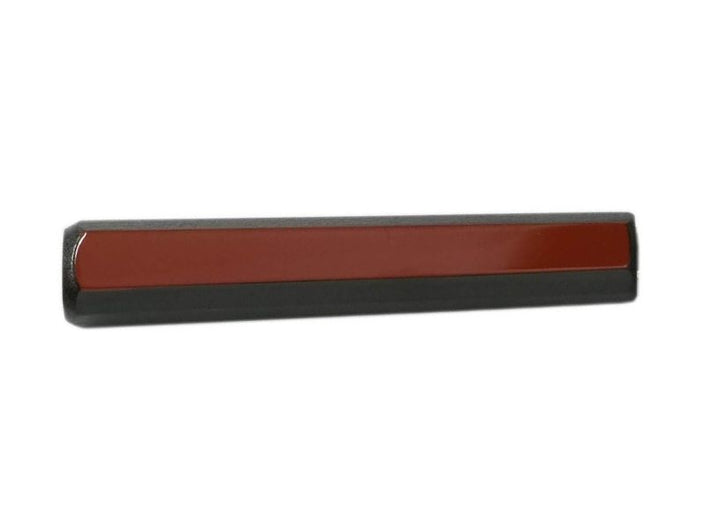
Akaro Handles
Akaro refers to the powerful color of red lacquer. This kind of lacquer is also known as urushi and is used for "urushi finishing", a traditional Japanese coating technique inherited for thousands of years. The octagonal handle is fully coated with a thin layer of raw lacquer to make the wood grain stand out beautifully as a base canvas. Two sides of the handle are then coated with multiple layers of akaro lacquer, with polishing done in between to give the lacquered surface a mirror-like luster. The scarlet vermillion color of akaro contrasts with the black tint given from the raw lacquer, creating a gorgeous impression. This lacquer style is much more resistant to water, and less prone to damage than ordinary wooden handles.
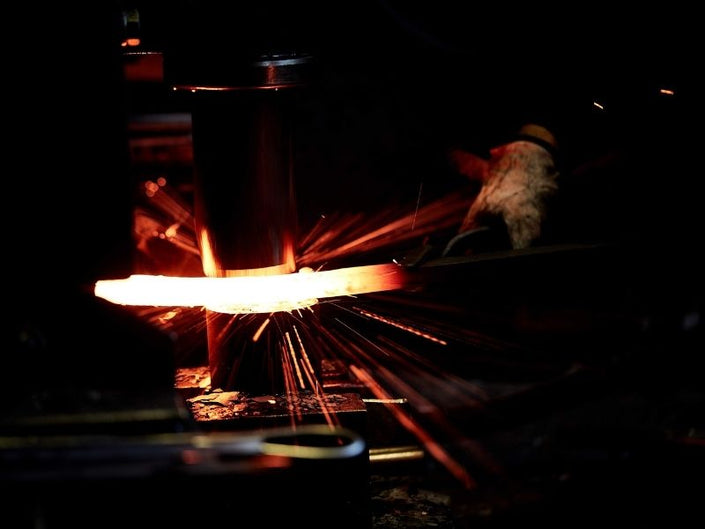
Forge Welded
Forge Welded knives undergo a forging process where steel is heated to high temperatures and then shaped with a hammer. This carefully done process changes the internal structure of the steel, producing a blade with superior hardness levels. Highly skilled craftspeople forge, quench, and create the knife's cutting edge by hand, resulting in a sharp blade with long edge retention.

Optional Engraving
Optional Engraving Service
Sakai Ichimonji provides complimentary engraving using either Japanese Kanji or English Alphabet. Please specify your preference. For details, please visit here
A knife store that has supported the history of knives and food culture in Japan.
It has been 600 years since the birth of swordmaking in the Sakai region of Japan. Sakai Ichimonji Mitsuhide's and it's craftsmen continue to build on that legacy by producing the finest blades in Japan.
This is where the culture of completing a dish of sashimi by "just cutting" and the culture of expressing sharpness as "taste" was born.
For 70 years, we have been connecting the spirit of Sakai's craftsmen with the passion of chefs in Osaka's kitchen equipment shopping district, known as the kitchen of Japan.
We are very happy that our knives can be used by people all over the world.
Precautions
After use, wash off any dirt and wipe thoroughly with a dry cloth to remove any moisture. This product is not for use with frozen foods.This product is handmade, so each piece will be different. Please use the weight and length listed as a guide. Each material is natural and may vary in color. It is not the same as the picture.We take great care with our inventory, but in the unlikely event that we are out of stock, we will contact you by email to let you know.



























